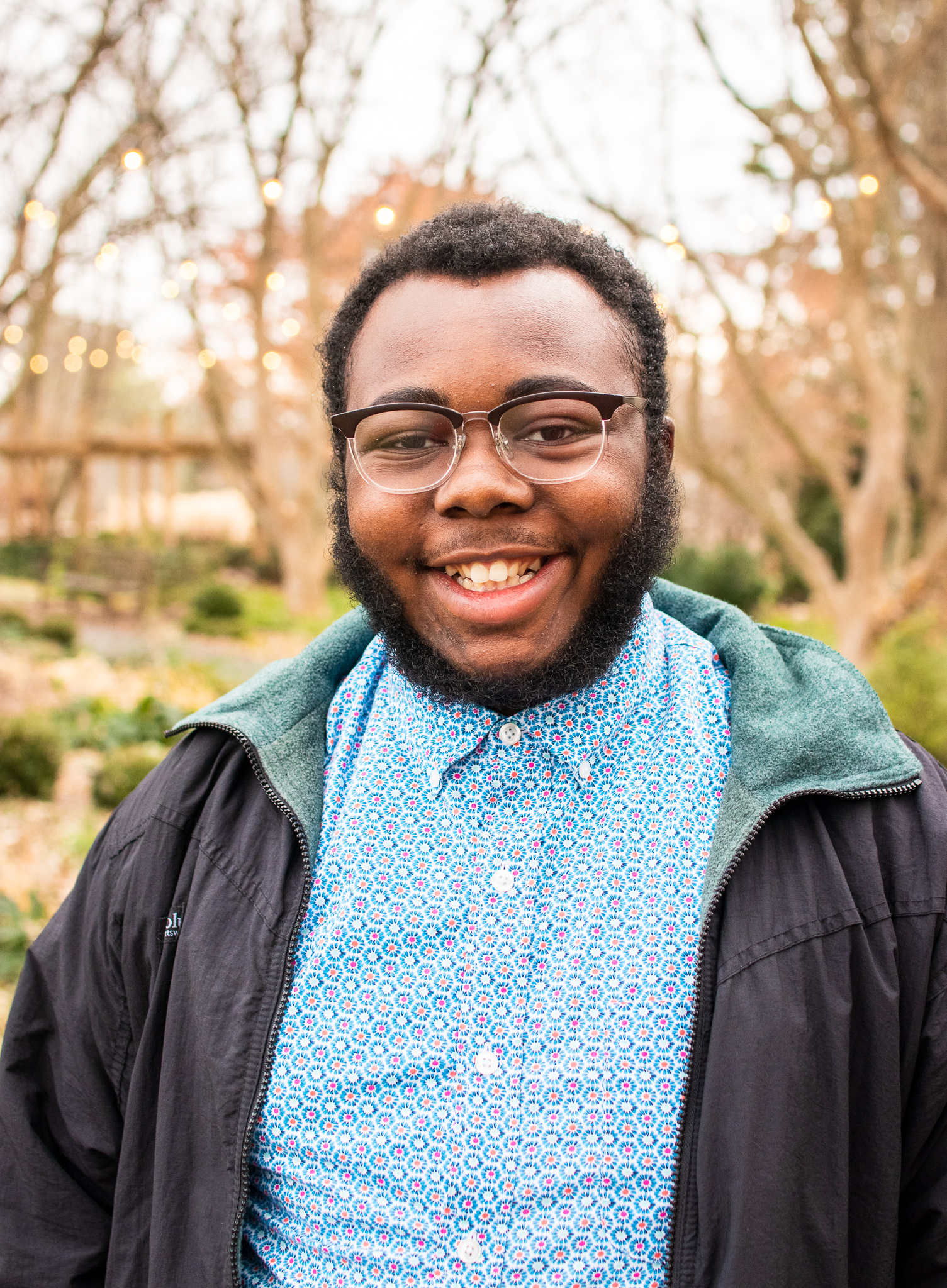Writer Joe Hughes III Explores Vulnerability and Stirs Public Conversation
Joe Hughes III is a Black writer and poet from Woodbridge, VA and currently studies creative writing at Virginia Tech. He is a self-explorative and reflective writer. He focuses on vulnerability while using personal narratives to establish a sense of empathy with his readers. He believes that by contributing personal experiences to public conversations, we can begin understanding complex problems and developing solutions for generational illnesses. His work explores the legacies of slavery and misogyny as well as the African American experience and mental illness. He enjoys writing comedy to inspire vulnerability and to make the world a friendlier place. Joe actively posts on his Instagram page announcing poetry performances and Instagram Live discussions with other local artists.
His poem, “Soccer (Death to all Black Boys)” was originally published in an Instagram publication titled “wordofmouth_lw”.
Soccer was the compromise I made with my dad between hitting other boys for sport and dancing inside for fun
My dad loved me quite deeply, so he coaxed me to play sports, so he laughed when I would dance so he thought it strange when he found I liked talking to girls as friends more than boys
50 Cent never caught my attention or interest; my eyes have been translucent and I cannot help but think that back then you were content
Back when Isaiah was gay for liking the color pink. Back when I was a pussy for not fighting my classmate. Back when my lacking care for big guns and basketball made me feel like a female.
My mind was cold with a lack of pigment or imagination I wanted to color for fun, draw comics, and see the world without my blue being pink,
without being forced to think that warmness was not straightness, that I could hurt another man but not have loved him deeply.
Yet I emerged with the truth; it was you who fed the lie;
the Word that black boys must die because their skin indicates sinful fun, so feminine, and queer, and strange. You hate love blind to hardness and cruelness.
I know black boys in these streets; guideless and blinded by the same rapid virus as me. Devin held a gun on him and couldn’t say how he felt. We walked home, and he mumbled every word as though he meant not a single one he said; half commitment in half love. Is it possible to be in love, as a black man, without warmth?
Too often have I witnessed the death of many black boys to a matter of the heart, so easily cured by an acceptance of the black soul; how lovely the heart black men own and hold, but ripped so quick by you, you thief neither true or kind in your blind conquest old and trite. The will of imps guides your eyes. Untrue it is that I should hate my own heart.
I can’t fight hate with hatred But I cannot seem to love how you’ve killed black boys with no knife No bombs or bullets in sight. It was by thought that you killed the heart and soul of black boys.
His next poem, “When I hear the Phrase ‘Not You’ ” was written for his Twitter page in response to the murder of Ahmaud Arbery, who was killed in February 2020.
When I hear the phrase “not you,” I get scared; do you mean not my dark skin, not quite my complexion? Or not me today, or not me this time, or not me that you will kill?
The phrase brings about the feeling of belonging to
death at an age before speaking, at an age where pigment is darker, a monstrous discolor. What age is this, the age before birth?
I saw an American flag today, stuck to the back of my friend’s truck. Would he kill me for the sake of my color? What if my skin was light? What if I dressed in a suit and tie? What if I spoke without swagger, and never lied?
(And they wonder why we mad!)
Why are guns still tied to black bodies? Invisible strings latched to triggers are pulled taut as time ticks in inevitable
death. Even Martin once felt fear at the idea of being too angry.
There will be no funeral this time. This time there will be no coffins or mourning or hoping that change is coming. Coming, indeed, is
not the word I would use to describe the tired black hand banging on heaven’s white gates straight lipped and narrow browed. Focused. Focused. Focused.
There are too many questions in a time of funerals. Not enough
death in a time of life. Not enough violence in a time of peace. Would I kill you for the sake of my family?
They say black men are angriest when jogging in their neighborhoods.
(Shoot them while you can!) Would I kill a stranger if they wanted to kill me?
You? No, I mean somebody else. Not you.
This final free verse poem is a commentary on “the relationship between white influences and the black artist…” This poem was published in Virginia Tech’s research journal, Philologia.
The Father runs his finger through my curls
and tells me of the ways that the pencil should feel
when I am to grab it and speak of
Michelangelo
or Washington or Zeus,
the men that spread ivory spores
through my blackened mind,
and corrupt the synapses of the back of my stem.
White men wrestle and bellow
in the back of my mind,
reminding me that they are idols
and I am an afterthought in the world of whiteness.
Crevices of the blackened mind once filled with tar
are now ridden with marble, limestone, and gravel.
I ponder these remedies in half-words
as my eyelids fall and open like the sun between clouds.
It is only when I rest
that I envision a darker world–
muddy fields with rough rocks and wild bears,
and blackbirds flying with no hurry.
But even in sleep,
they are blotched away in favor of white dandelions
and poop from bald eagles.
From my bed, I watch the Father
as he moves to my brother.
his legs clumsy, stumbling stilts,
hurrying in breath-rushed steps
towards the head of curls.
Oh, how he loves the curls
but denies the blackness that creates them.
The Father is a curious man.
He hacks blood and spews words from his mouth,
telling me from his cobbled teeth
the healing ways of whiteness.
He spits phlegm at the idea of black scars
and scoffs when I cry for the past,
proclaiming superiority over my fleeting thoughts
in favor of
the beauty of his intellect;
how white history will cure the world
and usher a period of enlightenment
and respect.
Yet his wan face speaks a paradox;
whiteness the cure but whiteness is sickness;
how is the sick to be cured by the sicker?
Don’t doctors clean their hands
before operating on the ill?
Put me on display, Father.
But not by your hands,
for I only accept the darker world
to craft the image of the dark;
the strokes of brown pastels on canvas
and the etching of eternity into mahogany.
I picture the world through shadow
to bring forth the rough cuts and blunt blows,
the stained reds and brutal browns
that show that my art does not kneel,
that greatness is not whiteness.
There is ever a latency
of the dark intelligence
and the subdued blackbird.
Oh, how the bird strives to be unbound,
to be itself in the face of darkness,
and to know the face he holds
is not the only of its kind.
This is all that I wish for, Father;
for you to use your whiteness you love
to turn numbing into praising
and to bring forth darkness,
which the dumbed negro mind may say
that you created.
If you would like to read more of Joe Hughes’ poetry, you can find him at www.joehughesiii.weebly.com, on Twitter and Instagram @joehughesiii.
You can watch his recent Instagram Live Poetry Corner: Abstraction as Black Freedom by clicking here.
We are proud to support Joe who is a talented local poet exploring difficult issues such as race, masculinity, and injustice. We hope you will continue to follow Joe and support his writing.



